John Hurrell – 25 November, 2011
Whatever the reasons you might find the written answers here interesting, the work has other things going on.
Auckland
Matthew Crookes and Christina Read
Why Bother Building Scales.
16 November - 10 December 2011
Having knowing parallels with the activities of pollsters in the current election, this exhibition is intended as a sustained attack on the assumptions of data collecting questionnaires, or interviews, those surveys and measuring devices that invariably endorse the ideologies of their creators - even when they are addressing artists. It does this through Matthew Crookes’ expertly assembled and passionate essay, and the presentation of two flat-screen monitors in the Window exhibiting space. The two components (static and moving texts) work intriguingly together.
Crookes can be read carefully at home (he advocates a Camusian and Sartrean notion that creative energies essentially involve a withdrawal from the world, rendering any attempted research to probe into or analyse the process by collecting data absurd - so laughable that it is foolish to bother.) but you need to view the library installation several times to get its real point. He and Christina Read have made scrolling videos of texts to catch the attention of library visitors. Both are long and slow moving so they need to be watched/read over several attentive bursts.
On the left we see handwritten answers to questions on pages of a typed out questionnaire, and on the right a list in alphabetical order (using authors’ names) of the books in somebody’s home (we assume it is one of the artists). The titles themselves are not particularly interesting - they are of a type and predictable (similar to most artists’ tastes: as you’d expect, not much on cars, weapons, wildlife or sport) - it is more the focus on the structure and the assumptions behind the headings that has value, the psychological motivation that desires these lists in the first place.
Whatever the reasons you might find the written answers here interesting - they might for example tell us something about the reading predilections of the artists - the work has other things going on. The presentation is cunning in that the loops are not fixed or constant - sometimes they cross over. Handwritten replies to the questionnaire (it discusses travel, self, belongings, attitudes, and personal entertainment) occasionally migrate to the righthand screen and are briefly elaborated on. Even when ‘normal’ the list is amusing because its title (Books on my shelf that I have neither read or not read) is candidly ambivalent - especially if you believe books are not decorative status symbols but usable containers of ideas. The title could have not raised issues of usage, and normally you don’t discover it unless you happen to arrive when the video is scrolling through the last letters of the alphabet.
The questionnaire is also full of surprises and humour. Parts of the Self section which enquire about food and drink, likes and dislikes, values and personality traits, have large photographs of some of the given answers suddenly inserted - such as empty bus interiors, jars of Marmite, solitary beer glasses, and greasy chicken and chips.
Even if you are not prepared to spend several visits on this work there is the level of social identification to be considered. Do you compare your own values and interests with those indicated here, assuming there is no irony intended, that the lists are sincere and appear to be espoused in some way? Is the video display a form of academic proselytisation (though already speaking to the converted) but disguised as a critique of sociological data crunchers? It doesn’t seem intended as satire, and yet though fitting the content of the essay, still seems contrary to its rhetoric. An uneasy juxtaposition, but one worth spending time with.
John Hurrell
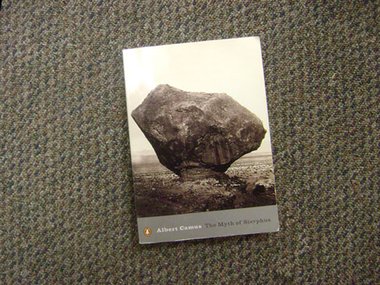
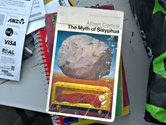
 Two Rooms presents a program of residencies and projects
Two Rooms presents a program of residencies and projects Advertising in this column
Advertising in this column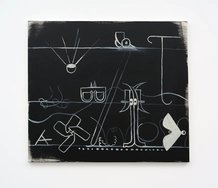
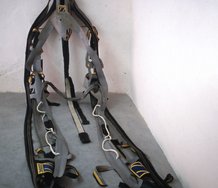
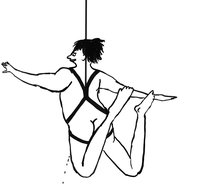
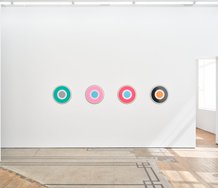
This Discussion has 0 comments.
Comment
Participate
Register to Participate.
Sign in
Sign in to an existing account.